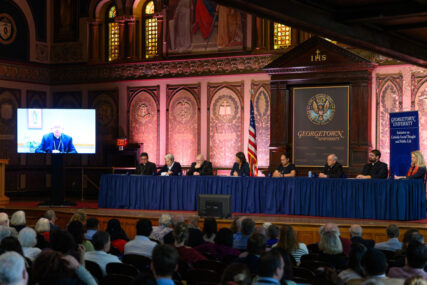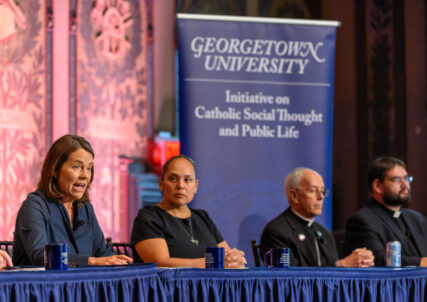WASHINGTON (RNS) — At a Thursday (Sept. 11) Georgetown University roundtable of some of the top U.S. Catholic voices on migration, Catholic leaders underscored the gravity of the threats immigrants are currently facing as the Trump administration escalates its mass detainment and deportation efforts.
“What I’m hearing from people and seeing in people’s eyes is fear,” said Washington Auxiliary Bishop Evelio Menjivar-Ayala during the public roundtable. They’re also feeling confusion and questioning, he said, asking themselves, “Where do we go from here? If we are not welcome, if we cannot find a safe place, if we cannot find a home here, where do we go from here?”
Menjivar-Ayala crossed the border without authorization and lived as a Salvadoran immigrant without legal status before becoming a U.S. citizen. “This issue for me is very, very personal. Because I was a stranger, and you welcomed me,” he said. “Do you know who else said that? My boss,” he said, referencing Jesus.
He said immigrants are using the same phrases they used during the Salvadoran civil war to talk about deportation, “Se lo llevaron,” or “They took him or her.” They would say that phrase, in El Salvador in the 1980s, he said, “when people were kidnapped, when people were taken by death squads, when they would disappear by the guerilla. This is the level of terror that people are feeling,” noting this is also true for millions of U.S. citizen children with immigrant parents.
Menjivar-Ayala and Nichole Flores, an associate professor of religious studies at the University of Virginia, said that many brown-skinned Latinos, including Flores herself, are carrying their passports everywhere because of immigration enforcement’s reported use of racial profiling tactics.
The Washington auxiliary bishop compared the long-term destabilization impact on immigrant communities with the lasting effects of hurricanes he had recently witnessed in Louisiana’s Diocese of Houma-Thibodaux.
“Our immigrant community is experiencing a hurricane of its own these days,” he said. “This is a category 4 storm tearing through the lives of people, destroying their dreams.”
There have been signs that U.S. bishops are not unified in their approach to the Trump administration’s anti-immigrant policy over the past six months. And on Thursday, during a media briefing and the roundtable itself, questions from reporters and audience members hinted at divisions underneath the surface for bishops and other Catholics.
“Do any of you see the possibility for a more visible, prophetic role by the bishops’ conference as a conference?” asked Dan Moriarty, senior program officer on peace and nonviolence at the Maryknoll Center for Global Concerns during an open Q&A, specifically highlighting the lack of a pastoral letter on the issue.
El Paso Bishop Mark Seitz pushed back on that narrative, saying, “I’ve been struck in my work as chair of the bishops’ committee on migration what level of unanimity we have and passion about this issue.” He instead blamed the problem of “getting our voice out” on a lack of interest from mainstream media.
None of the four bishops present at the roundtable were part of an interfaith letter in June that went beyond the official bishops’ conference letter to explicitly call on lawmakers to reject the budget for its harmful immigration provisions.

Speakers joined together for a roundtable on Thursday night Sept. 11, 2025 at Georgetown University in Washington D.C. Photo courtesy Georgetown University/Rafael Suanes
In an RNS interview, Seitz, who will be chair of the bishops’ conference migration committee for another two months, told RNS that, as financial need mounts among immigrant families whose lives are upended by the mass deportation campaign, he is working to mobilize Catholics “ to provide assistance to places where the greatest need may be — and it won’t only be in this country.
“ We’re going to be throwing people into situations that are worse than the ones they originally fled, and the resources are going to be lacking,” said Seitz of the mass deportation campaign. “ You just can’t replace what the government has been offering, and you can’t fix it. But we’re gonna do our best as a church,” he said.
As Immigration and Customs Enforcement ramps up hiring the officers that have been funded by Congress for the mass deportation campaign, Seitz said he had been mulling over and seeking guidance about the moral question of whether Catholics can, in good conscience, join ICE right now.
“ I’ve talked to some ICE agents and to some who are retired but thinking of going back to ICE who are approaching it from the standpoint that they hope that they can soften the approach just by their presence, and so that’s a moral argument of sorts,” Seitz said, but he also said he was concerned because “the messages I’m getting from ICE” are that agents will have less room for discretion and be expected to simply enact the administration’s policies.
The El Paso bishop said, “ Certainly the time may well come for many of them where they have to make that difficult moral choice to say in conscience, ‘I can no longer do this.’ I’m not sure that we’ve arrived at that moment yet.”
The bishop advised Catholics considering joining ICE that “you can never attempt to turn off your conscience.” In order to listen to a well-formed conscience, “continue to study, continue to learn, continue to seek advice, and make your best judgment about whether in the particular situation in which you find yourself, you can continue to do what they expect.”
During the roundtable, Ashley Feasley, the legal expert in residence at the Immigration Law and Policy Initiative at Catholic University of America’s Columbus School of Law, cited her experience working for U.S. Customs and Border Protection to say it was necessary to “humanize” Border Patrol officers. “They are just like us. They are fathers and mothers. They are brothers and sisters.”
Feasley said Catholics should focus on the conversion of their lawmakers, urging them to make human-centric migration policies and insisting they must take a stand or “stop representing me and the American people.”
“Since George W. Bush, every president has tried a form of immigration reform and has failed, and there’s been no consequences,” Feasley said. “We as Catholics must make this an issue that is important enough that people think twice about just blindly writing blank checks for more detention facilities and less oversight and less true meaningful reform.”
The Rev. Guillermo Treviño Jr., a co-chair of Iowa’s community organizing group Escucha Mi Voz, told Catholics to act together, citing Matthew 18:20, “For where two or three are gathered together in my name, there am I in the midst of them.”
“The more we change public opinion — that’s what’s happening with all of these stories — people don’t like agents with masks, people don’t like this police state,” he said.
But leaders also proposed explicitly religious solutions during the roundtable.
Flores pointed to St. Juan Diego’s struggle to convince his bishop that Our Lady of Guadalupe had appeared to him requesting a shrine, saying the story can guide Catholics toward compassion and mercy.

From left, Kim Daniels, Nichole Flores, El Paso Bishop Mark Seitz and Rev. Guillermo Treviño, Jr. speak as part of a larger roundtable on Thursday, Sept. 11, 2025, at Georgetown University. Photo courtesy Georgetown University/Rafael Suanes
“It’s a story about power. It’s a story about the most vulnerable,” said Flores. “What I want to ask all of us here is — do we believe Juan Diego when he shows up to tell us what’s going on, and will we allow ourselves to be converted by Juan Diego, to believe him?”
During the roundtable, Miami Archbishop Thomas Wenski recalled the 24th anniversary of the Sept. 11 attacks and said that just one day before the attacks, he was in a meeting with Immigration and Naturalization Service Commissioner James Ziglar, who expressed confidence that there would be major immigration reform that year.
“Ever since the World Trade Center, America has been in a bad mood,” said Wenski. “Our immigration programs have been reinterpreted as a problem of national security,” he said, pointing out that the 9/11 attackers arrived legally.
“Fear has been what has been motivating, or maybe not motivating, but paralyzing us,” he said. While speaking to press, Wenski asserted, “ The immense majority of the migrants, even without legal status, are not law-breakers. They’re being broken by the law.”
Sister Norma Pimentel, who heads Catholic Charities of the Rio Grande Valley, said at the roundtable that families afraid to go out are experiencing devastating financial consequences. “In our Diocese we’re responding to families who are afraid and helping them because they will be homeless,” she said.
In Los Angeles, Archbishop José Gomez told the roundtable’s audience that many priests in the archdiocese say “at least 30% of people attending Mass aren’t coming anymore” and that Catholic schools have also been impacted.
Gomez highlighted the newly launched Family Assistance Program that will work to help families too afraid to leave their homes with essentials like groceries.
“That family assistance fund has been very successful — the generosity of many people from the archdiocese and also finding a way to support the families where they are — I think that’s made a big difference,” he said.







